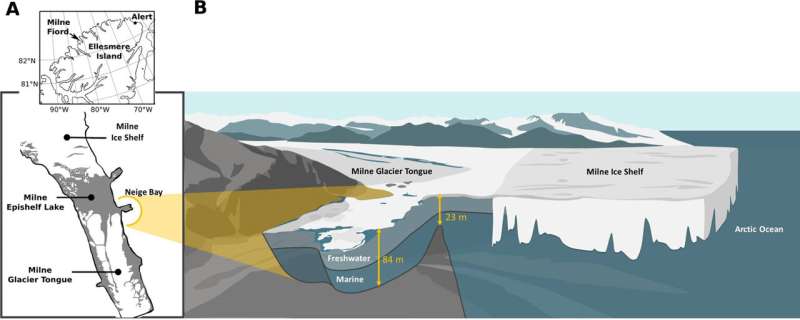Microbiologists study giant viruses in climate-endangered Arctic Epishelf Lake
AUGUST 30, 2022
by American Society for Microbiology

(A) General location and local geography of the Milne Fiord epishelf lake in 2015 (adapted from reference 7). Gray areas of map indicate lake ice detected by RADARSAT-2 imagery. (B) Cartoon showing accumulation of freshwater behind Milne Ice Shelf and the bottom topography of Neige Bay. Credit: Applied and Environmental Microbiology (2022). DOI: 10.1128/aem.00228-22
Less than 500 miles from the North Pole, the Milne Fiord Epishelf Lake is a unique freshwater lake that floats atop the Arctic Ocean, held in place only by a coating of ice. The lake is dominated by single-celled organisms, notably cyanobacteria, that are frequently infected by unusual "giant viruses." Investigators from Université Laval, Québec, Canada have produced the first assessment of the abundance of the viruses in this lake. The research is published in Applied and Environmental Microbiology.
Viruses are key to understanding polar aquatic ecosystems, as these ecosystems are dominated by single celled microorganisms, which are frequently infected by viruses. These viruses, and their diversity and distribution in the Milne Fiord Lake have seldom been studied. The team is now working to sequence the giant viruses, an effort that will likely lead to understanding how the viruses influence the lake's ecology via their interactions with the cyanobacteria they infect.
Quickly rising temperatures limit the time remaining to for microbiologists to develop a clear picture of the biodiversity and biogeochemical cycles of these ice-dependent environments, as well as the consequences of the rapid, irreversible changes in temperature. "The ice shelf that holds the lake in place is deteriorating every year, and when it breaks up, the lake will drain into the Arctic Ocean and be lost," said corresponding author Alexander I. Culley.
"Our results highlight the uniqueness of the viral community in the freshwater lake, as compared to the marine fiord water, particularly in the halocline community," said Culley. The halocline is an area where salinity falls quickly as one ascends the water column. This environment offers niches for viruses and hosts which are found neither in freshwater nor marine layers of uniform salinity, he said.
More:
https://phys.org/news/2022-08-microbiologists-giant-viruses-climate-endangered-arctic.html
